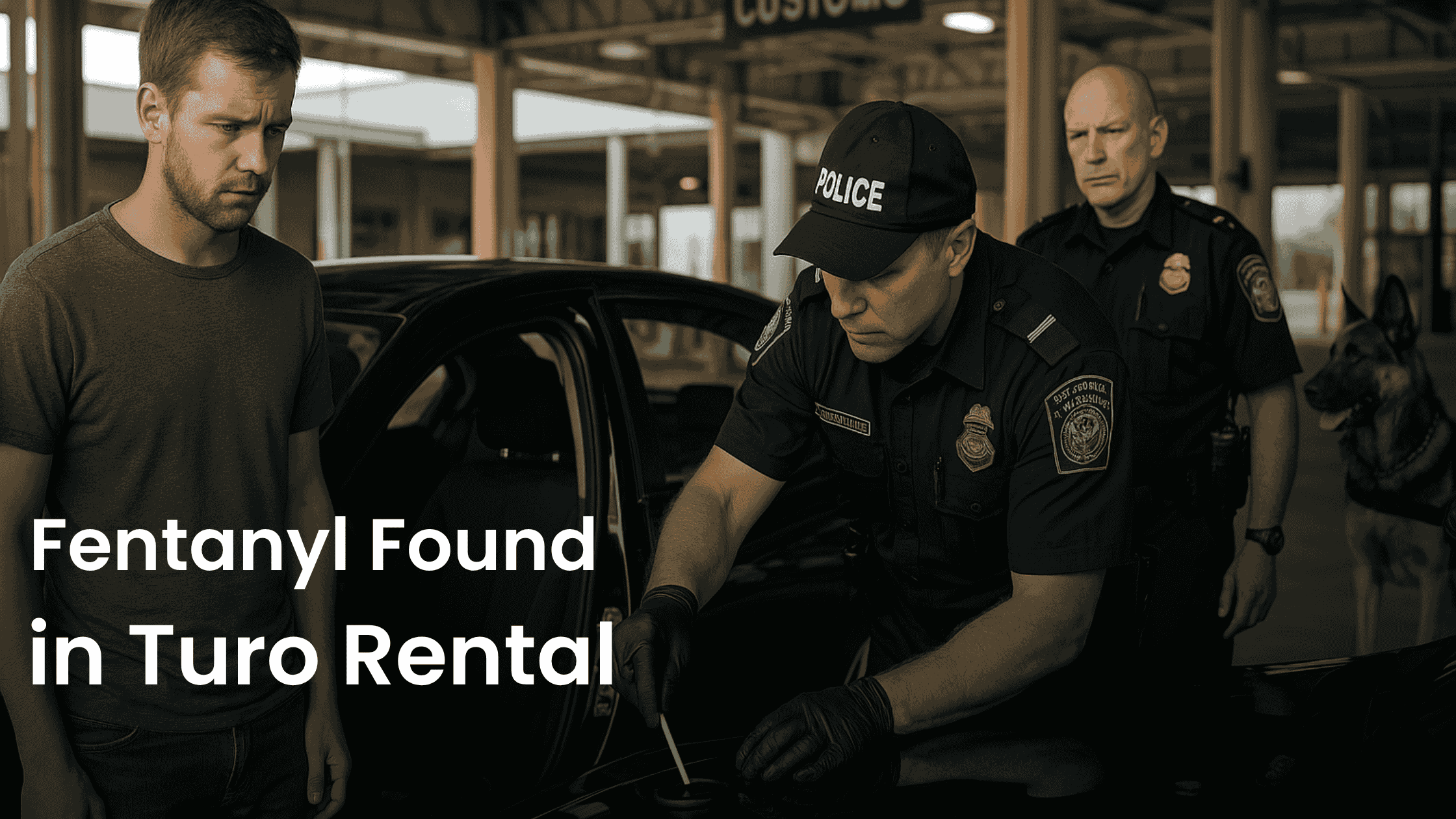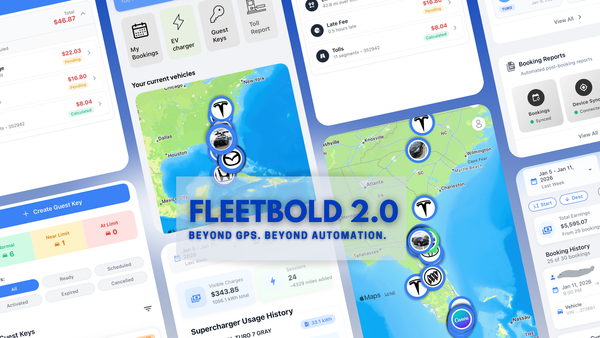Fentanyl Found in Turo Rental: A Wake-Up Call for Hosts Who Skip Inspections
A Turo guest was detained at the border after fentanyl was allegedly found in the car. Here’s why Turo hosts must stop skipping vehicle inspections — before it’s their problem.

A Routine Border Crossing Turned Nightmare
On July 26, 2025, a shocking story surfaced on CTV News. A man from Calgary was stopped at the U.S. border while driving a Turo rental. According to the report, border agents claimed they found traces of fentanyl in the vehicle. The man, who had no criminal record and no known association with drugs, was detained for hours while agents brought in drug dogs, swabbed surfaces, and treated the car like an active drug transport.
He was eventually released, but the damage was done. His name was flagged. His story made headlines. His life was disrupted and all he did was rent a car.
This story spread fast. And while most of the attention focused on the guest, every seasoned Turo host immediately saw the bigger problem: what if that had been my car?
The Silent Exposure Hosts Live With Every Day
Being a Turo host means accepting a certain level of risk. You’re giving strangers access to your personal or commercial vehicle, often unsupervised, and hoping they’ll treat it with care.
But this story exposed a darker truth: your car can become evidence in a criminal investigation, even when you’ve done absolutely nothing wrong.
The fentanyl may not have been placed there by the guest. It could’ve been residue from a previous trip. It could’ve been from a delivery driver transporting something questionable. It could even be the result of false positives and yet, the guest still ended up detained. If the car had been seized or flagged, the host’s name and plate would’ve been on the report.
In a world where law enforcement doesn’t know the difference between an owner and a platform user, that line gets blurred fast.
And if you’re not doing thorough inspections if you’re skipping checkouts or delaying them until it’s “convenient” then you're operating blind.
The Critical Mistake Hosts Keep Making
Most hosts perform their checkout once the car is back at their base or parked at home. It seems practical. Easier. Quieter.
But this habit creates a major vulnerability. By the time you inspect the car, you’ve already driven it. You’ve been inside. You’ve moved it across public roads. And in doing so, you’ve assumed legal and physical control of the vehicle without knowing what’s inside.
If there’s something illegal left behind, you're now the one transporting it.
And that’s not just theoretical. There are hosts who have been pulled over and found items they didn’t even know were in the car. Some discovered drug residue. Others found vapes filled with questionable substances, pills without labels, or even small weapons. Each of those discoveries came after they drove the vehicle home.
Now imagine if those hosts had been stopped by police and had no documentation to prove that the items didn’t belong to them.
The First Ten Minutes Could Save You Ten Hours of Pain
The moment you regain possession of your vehicle whether it’s a guest returning the car, a delivery drop-off, or you’re retrieving it yourself that’s when your checkout must begin.
Not later. Not when you have more time. Not after dinner.
You pop the doors. You look under the seats. You sniff the air. You check the glovebox, center console, floor mats, and trunk. You take clear, timestamped photos of every angle especially if there’s anything suspicious or dirty.
Even if the car looks fine at first glance, that’s not enough. A speck of powder. A smell that doesn’t belong. A vape that wasn’t listed in the guest’s profile. These are details you must catch now not after you've left the parking lot and driven onto public streets.
Once you're moving the vehicle, you’re liable for what’s inside it. If law enforcement stops you and something is found, it’s your word against theirs unless you have records to prove otherwise.
It's Not Just About Safety — It's About Your Business
A flagged car. A detained guest. A police investigation. These aren’t just PR headaches. They’re risks that can shut down your operation, suspend your Turo account, or land you in a drawn-out claims process where you're forced to prove your innocence for something you never did.
And in today’s climate, even the accusation can cause irreversible harm. Social media spreads headlines faster than truth. A story like “Fentanyl found in Turo car” sticks, even if your name is cleared.
The only defense? A documented, immediate, consistent checkout process that protects you and your reputation.
What Every Smart Turo Host Should Be Doing Now
If you haven’t already created a system for handling checkouts like a professional business, now is the time.
You need a standard process. One that doesn’t depend on memory or guesswork. One that captures the car’s condition before and after each trip, and leaves a digital trail.
Use tools that log the time of your photos. Save them in the cloud. Label them clearly by guest name or trip ID. If you can, use platforms like FleetBold that automatically associate vehicle data, guest details, and location into a single report you can pull in seconds.
You should also avoid driving a car even for a block unless you've inspected it fully. No shortcuts. If that means doing a walkthrough at a parking lot, a driveway, or the airport curb, then that’s where you do it. Yes, it might be awkward. But awkward is better than arrested.
The Bigger Picture: Guest Detained, Host at Risk
In the case of the Calgary man, he was eventually released. But had the car been seized, or if further investigation was required, the next call may have gone to the host. And if that host couldn’t show a clear history of vehicle condition and usage — they’d be relying on luck, not evidence.
This case should remind us all that hosting on Turo isn’t just about passive income. It’s about active responsibility. And that means treating each vehicle return as a potential liability checkpoint.
You’re not just checking for scratches anymore. You’re checking for anything that could jeopardize your business, your insurance, or your freedom.
Conclusion: It’s Not Your Crime, But It Could Be Your Consequence
No host wants to think about drugs, arrests, or border patrol when handing off a car. But if you’re in this business long enough, something will go wrong. A guest will lie. An item will be left behind. A policy will be challenged. And in that moment, the only thing that protects you is what you’ve documented and when you did it.
So don’t delay. Don’t assume. Don’t cut corners.
Every car, every time. Check it. Inspect it. Document it. Immediately.
Because the next guest might be detained for fentanyl and if you're not careful, you might be next.






